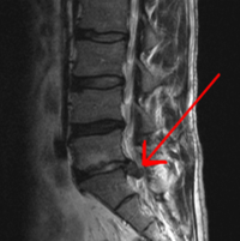Healthy Life: Posteriolateral Protrusion of Lumbar Discs (819)
Healthy Life: Posteriolateral Protrusion of Lumbar Discs
蘇鎮邦:舒整物理治療師(Manipulative Physiotherapist)人類工程師 (Ergonomist)
Posteriolateral protrusion is a very rare sciatic condition (figure 1,2). If it is not treated early, muscle atrophy and loss of bladder control may result. It is very difficult to diagnose because there is generally no back pain at the early stage. There may be only slight pain and numbness in the calf. At the later stage, when there is muscle weakness and a bladder problem then nerve compression may be obvious.
First case: a 70 years old female drove to Brisbane from Melbourne with her husband. On the way home, she started to feel pain on the outside of her right calf. She thought it might be caused by excessive walking. On examination, there was no pain on palpation of the calf. However, palpation on the fifth lumbar spine reproduced her pain. It was due to the compression on the fifth spinal nerve. It might be the long sitting in the car rather than excessive walking that caused the calf pain.
Another case, where the patient felt pain and tightness in the calf especially waking up in the morning, required moving for 10 -15 minutes before it became loose. He saw the doctor and had anti-inflammatory tablets for 5 days. His pain was relieved. However, the pain came back after he stopped the tablets for a few days. He took more tablets but it was no use the second time. The condition got worse. I explained to his mother, who was my former patient and who brought him to me that the tablets stopped the pain in the early stage. However, he did daily activities as normal which further aggravated the condition.
Posteriolateral protrusion is usually caused by bulging of the disc under abnormal pressure e.g. lifting heavy objects and prolonged sitting. The bulge comes out suddenly and in large quantity and presses onto the deeper nerves which supply the extremities. Back pain is bypassed because the superficial nerves that supply the back were spared. Thus, patient only feels leg pain.
If neurological tests e.g. skin sensation, knees and ankles reflexes, and straight leg raising test indicate nerve compression, then urgent treatments are necessary. Any delay in relieving nerve compression can cause permanent damages and long term problems.

(Figure 1) The relationship of spinal cord, spinal nerve and herniated disc

(Figure 2) compression of the spinal nerve during lifting or bending of the lumbar spine
